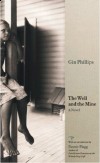The word “hopeful” pops up often in press for Alabama-based author Gin Phillips’ The Well and The Mine (Riverhead Books, 2009). However, this is no document of the recent presidential race, nor is it a rosy-tinted self-help guide. In fact, Well is a debut novel set in the coal mining town of Carbon Hill, circa 1931. The Great Depression has set in, though the Moore family barely notices:
“‘Course in ‘29, banks wobbled and shook, businesses shut down all along Main Street. Went broke,” says patriarch Albert. (Well is told in the voices of each of the Moore family’s five members.) “Must’ve been a quarter of those storefronts boarded up. Didn’t make much difference to me. Mines stayed open—-with a few less men put to work in ‘em-—and life went on. No better, no worse.”
This simple passage, which is indicative of the tone of the novel, touches a nerve. Here we are almost 80 years later and people are facing similar situations. What makes Well and its characters hopeful is that they’re neither bowed nor shaken by hard times. Life for this family is about subsistence (sometimes drudgery) but also the simple magic that comes from being together, being in close to nature and learning new things.
Magic, to middle child Tess, is the family’s drinking water supply. The well is the source of her wildest imaginings. “I loved the well then,” she says in the book’s opening passages. What is also revealed in the first chapter is that Tess witnesses a woman throw a baby into that well. It’s dark, the woman is in shadow and it all happens quickly, but the crime deeply disturbs Tess. With the help of her older sister Virgie, she begins an investigation into the local women, trying to pin-point the culprit.
But the baby, though it floats like a ghost through the entirety of Well, has little to do with the story. Instead, that haunting apparition is a clever literary tool to draw the reader in. It’s the lives of the Moores, and by extension the residents of Carbon Hill, that enchant. In easy, conversational tones Phillips gives voice to each of her characters, letting them tell their own stories.
In one section, Albert’s coworker—an African-American called Jonah—reveals: “I got a cousin in Birmingham, always talkin’ ‘bout uplift. ‘Bout how we Negroes oughta do what the boss tells us, work real hard, not gamble or drink up your pay, and then we’d have somethin’ worth havin’… Boss pays you seven dollars a week, and food and rent and clothes for the children cost seven dollars and fifty cents a weeks, ain’t no use blamin’ sin for bein’ at rock bottom.”
Teenager Virgie imparts this: “When I was learning long division, the numbers all swam together and I hated it. Aunt Celia said that it didn’t pay to be too smart, that it wouldn’t serve me well anyhow. I figured out long division anyway, partly because that made me mad, and partly because when I repeated it to Papa, he said, ‘It don’t pay to be too stupid, neither.’”
Though Phillips’ characters are poor, they’re also proud and resourceful. Albert works long hours in the mines and his wife Leta carries water, milks the cow, scrubs the floors and launders the clothes until her hands are raw, but there’s a sense of security that comes from the Moores’ ability to provide for themselves. They grow their own food and share what extra they have with their neighbors. As the story unfolds it’s quickly apparent that, even as dirt farmers, the Moores are doing better for themselves than many around them and that this is, indeed, a success story more than a story of hard times. Hence all that hope.
Sensitive, sweet and real (yet blissfully light in all the places it so easily could be dark), Phillips’ Well moves with the ease of a beach read yet offers the pithy substance of a time-tested classic.
Gin Phillips reads from The Well and The Mine at Malaprop’s Saturday, July 11.
—Alli Marshall, A&E reporter




Before you comment
The comments section is here to provide a platform for civil dialogue on the issues we face together as a local community. Xpress is committed to offering this platform for all voices, but when the tone of the discussion gets nasty or strays off topic, we believe many people choose not to participate. Xpress editors are determined to moderate comments to ensure a constructive interchange is maintained. All comments judged not to be in keeping with the spirit of civil discourse will be removed and repeat violators will be banned. See here for our terms of service. Thank you for being part of this effort to promote respectful discussion.